Exploring the theme of “New Asia – New Opportunities” at annual forum for CKGSB students and alumni
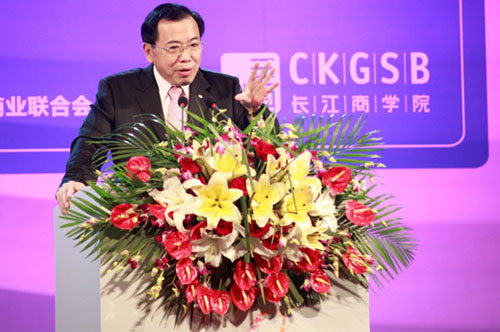
Li Dongshen, Chairman and CEO of consumer electronics giant TCL, spoke on the challenges Chinese enterprises face and how to overcome those challenges
Beijing, 10 August 2012—For much of the post-war period, China watched from the sidelines as East and Southeast Asian neighbors drove successive waves of growth and economic integration across the region. Japan was first out of the gate, followed by “Asian Tigers” such as Singapore and South Korea. The “Tiger Cub” nations of Indonesia, Malaysia, the Philippines and Thailand came next. Much progress has been made toward development and economic integration, but per capita GDPs in most of the region’s nations still languish beneath the global average.
Enter China. Without greater “South-South” trade and investment with its Asian neighbors, China will be unable to sustain the rapid urbanization and economic development it has seen in recent decades. But if China commits itself to leading the next phase of Asian growth and economic integration, Asia could create a brighter future for itself and drive global growth for many decades to come. CKGSB is encouraging this regional integration by equipping Chinese business leaders with the insight they need to create new business ties across the region. It was to further this goal that on July 20th, the school held its 2012 CKGSB Summer Forum—a gathering in Kunming, China of hundreds of CKGSB students, alumni and influential figures from around China and Asia.
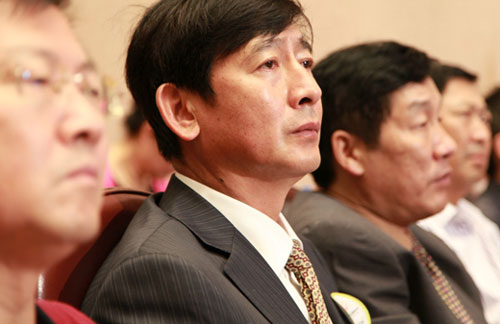
CKGSB’s students and alumni are leaders of some of China’s most successful businesses and have a strong role to play in regional economic integration. Once economic and trade policies have been set, a large part of actual regional integration will depend on individual transactions between businesses. But many private Chinese business owners have so far concentrated on growing their businesses within China and know very little about opportunities in nearby countries.
The knowledge and ideas to which CKGSB is exposing business leaders through events such as the Summer Forum provide a kernel of motivation for entrepreneurs to start exploring new opportunities outside of China, which can eventually lead to a more robust regional economy.
An Overland Gateway to Southeast Asia
The forum’s location in the Yunnan Province capital, Kunming, was apt for the theme of “New Asia – New Opportunities.” Yunnan borders Myanmar, Laos and Vietnam. Once a sleepy backwater in China’s rural southwest, the province is now a hub for growing integration between China and Southeast Asia. Sparked by a 2010 free trade agreement, overland trade between Yunnan and Southeast Asia is flourishing. Planned rail, highway, pipeline and power transmission projects will form a web of transport and energy links between the two areas, including an eventual rail link to Singapore’s doorstep.
Yunnan has also been a laboratory for the Chinese central government’s slow but steady progress in RMB liberalization: as part of a pilot program, some companies in Yunnan can now settle their overseas accounts with Southeast Asian trade partners using RMB—a first for the formerly closed currency.
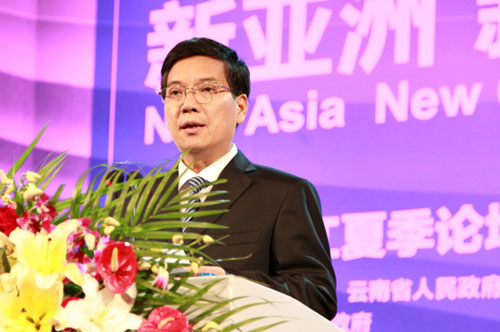
Yunnan Party Secretary Qin Guangrong looks forward to increased economic integration between China and Southeast Asia
After a warm welcome to the audience, Yunnan’s top ranking official, Party Secretary Qin Guangrong, kicked off the CKGSB Summer Forum by outlining specific policies and projects that are supporting Yunnan’s driving role in regional economic integration between China and Southeast Asia. Yunnan is well positioned, noted Qin, to become a hub for powerful new trade and investment corridors linking China to key economic centers in Southeast Asia. These corridors will be vital in building an open and prosperous economic community in East and Southeast Asia.
What China’s Rise Means for Asia
CKGSB Dean Dr. Xiang Bing then took the stage to place China’s role in East and Southeast Asia into a historical context. He noted that despite China’s astounding transformation during the past three decades, regional, and even global, economic dominance is the norm for China rather than an anomaly. “China was the greatest contributor to global GDP in eighteen of the last twenty centuries,” said Xiang.
He also noted that China is also much more dependent on trade than many Western economies, meaning it is in China’s interest to break down trade barriers and increase business ties with its neighbors.
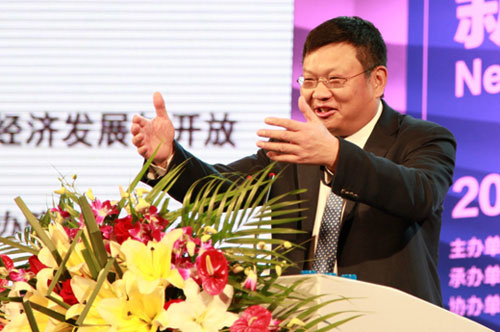
Xiang Bing of CKGSB discusses the historical precedence for China’s role in the Asian regional economy
Xiang attributes China’s recent success to an underappreciated openness to new ideas and influence from the global economy. This outward-looking perspective is nothing new, but has a strong historical basis, especially in the Tang and Ming dynasties. The CKGSB Dean concluded that China’s increasing economic strength will play a positive role in the new Asian economy.
Analysis of Asia’s New Opportunities
The Forum continued with an overview of Asia’s status on the economic ladder through analysis of developmental trends, policies and capital markets, as well as discussion of the challenges and opportunities facing Chinese enterprises in this context.
Long Guoqiang, Director of the Department of International Economic Research at the State Council Development Research Center, believes that the Asia can become the new engine of global economic growth, especially in light of accelerating trade and investment integration and continuing rebalancing of divisions of labor. He believes China will benefit from regional integration through new markets in which to sell the new technologies it is developing, as well as strategic resource and energy opportunities.
The next speaker was Moon Kook-Hyun, a South Korean executive widely admired at home for his commitment to innovation and corporate responsibility. Advocating new management models within Asian economies, Moon proposed that the modern Asian CEO should break out from the dated management models of the past decade and promote “360 degree” sustainable innovation for enhanced, multilevel cooperation among governments, societies and enterprises. He also argued the benefits of employing more regional free trade agreements.
Supporting the development of focused economic growth points and reinforcing earlier comments on the significance of the forum’s location, CKGSB Finance Professor, Zhou Chunsheng spoke next. Zhou highlighted the region’s adversity to the global economic slowdown and its remarkable 11.3% GDP growth in the first half of the year. Zhou added that the shift in focus towards new growth in Southwest China and Southeast Asia makes sense in light of decelerating growth on China’s eastern seaboard.
Next up was TCL Chairman and CEO Li Dongsheng. As head of one of China’s most talked-about companies, he raised some eyebrows in the audience when he stated, “In the decade since WTO entry, China’s economic position has seen drastic change. Chinese enterprises face both challenges and opportunities, but the challenges are greater.”
Li went on to explain that Chinese companies can overcome these challenges by embracing economic integration and investing in their international capabilities. “For Chinese enterprises, the following three aspects will become the most important in establishing a competitive advantage: industrial capabilities, innovation in global operations capabilities and technology and globalized competition.”
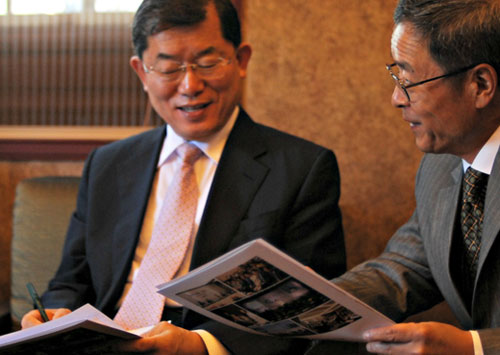
The 2012 CKGSB Summer Forum gave school’s students and alumni a strong overview of economic trends in the shifting Asian regional landscape. As some of the most influential businesspeople in China, these CKGSB students and alumni are well positioned to put this knowledge into action, building growing trade, investing and building new business ties. CKGSB aims to continue the sharing of knowledge and experience between China and the region, and hopes that it can play an integral role both in China’s economic development and in Asian economic integration.